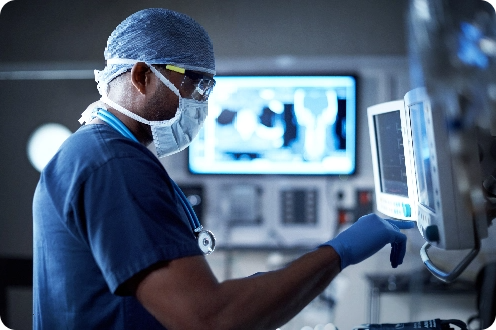Breast Health Services
Your Breast Health Center, Close to Home
Baptist Memorial Health Care takes a proactive and comprehensive approach to breast health services. With all cancers, early detection and treatment is your best line of defense; breast cancer is no exception. Baptist is at the forefront of comprehensive breast care, innovation and technology with imaging services throughout Tennessee, Arkansas and Mississippi.
Our breast health team includes surgeons, medical oncologists, radiologists, radiation oncologists, plastic surgeons and clinical cancer geneticists who work together to provide you with a personalized treatment plan.

Comprehensive Breast Program
Baptist offers a comprehensive breast program at the Women’s Health Center. This location not only offers screening, diagnostic and pre-surgical services, it also offers other services to include enhanced care for those who are at a greater risk for breast cancer or have benign breast conditions.
The Baptist Comprehensive Breast Program offers an efficient multidisciplinary approach to care with a coordinated physician network recommending treatment and care plans centered around the patient. The convenient satellite mammogram screening locations are available throughout the Mid-south and Baptist North Mississippi.
Explore our Comprehensive Breast Program
Baptist Women's Health Center is accredited by the American College of Radiology as a Center of Excellence and also by the National Accreditation Program for Breast Centers (NAPBC).
Breast Health Conditions We Treat
In addition to breast cancer, Baptist Women’s Health Center delivers care for the following breast conditions:
- Breast pain
- Infection
- Cysts or lumps
- Fibroadenomas
- Masses
- Nipple changes or discharge
Breast Diagnostics and Cancer Screenings
Baptist offers quality breast cancer screenings and a comprehensive range of diagnostic and interventional services at our breast health centers. We use leading-edge technologies to accurately detect breast cancer early and devise treatment plans for breast cancer and other breast conditions.
Featured Technology
Contrast Enhanced Mammography
A contrast-enhanced mammogram can detect cancers that may not be visible on a standard mammogram, generating fewer false positives than MRI breast imaging and making breast tumors easier to see. It involves injecting a contrast dye into the blood before taking two mammogram images. The contrast goes to areas of increased blood flow in the body. Because breast cancers generally have more blood flow, they will often attract the contrast.
Contrast-enhanced mammograms have several additional benefits. The process is faster, less expensive and generally better tolerated than MRI. The mammograms may also provide patients with a definitive answer on the day of their visit compared to possibly waiting days or weeks for MRI results.
Contrast-enhanced mammograms are often recommended for patients with increased risk factors, such as dense breast tissue, because they have a four to six times higher risk of developing breast cancer than women with no dense tissue.
3D Mammography (Breast Digital Tomosynthesis)
Imagine being able to read every page of a closed book. That is how doctors describe 3D imaging. Our 3D imaging technology creates a higher quality image without increased radiation. This is especially important in screening patients with dense breasts.
3D mammography is available at the following locations:
- Baptist Anderson Regional Medical Center
- Baptist Cancer Center-North Mississippi
- Baptist Medical Group-Outpatient Care Center
- Baptist Memorial Hospital-Booneville
- Baptist Memorial Hospital-Carroll County
- Baptist Memorial Hospital-Collierville
- Baptist Memorial Hospital-Crittenden
- Baptist Memorial Hospital-DeSoto
- Baptist Memorial Hospital-Golden Triangle
- Baptist Memorial Hospital-Tipton
- Baptist Memorial Hospital-Union City
- Baptist Memorial Hospital-Union County
- Baptist Women's Health Center (East Memphis Area)
- Mississippi Baptist Medical Center
- NEA Baptist Memorial Hospital
Genetic Assessment
The Comprehensive Breast Program includes a staff of dedicated genetic counselors who help identify patients who with developing breast and possible other cancers due to their personal and family history.
Certain inherited gene mutations can sometimes increase a woman’s risk to develop breast cancer up to 85% during her lifetime. A blood or saliva sample can examine an individual's DNA to determine if he/she has an inherited gene mutation that can increase the risk to develop cancers.
If an individual is found to have an inherited gene mutation, there is discussion about early detection and risk reducing strategies
Are you at risk for breast cancer?
Risk assessment and genetic testing can help you develop a breast cancer screening and management plan with your doctor. Take this short quiz to learn more about factors that could possibly put you in the high-risk category.
Mammogram
What can I expect at my mammogram?
Screening mammograms (image) help detect tumors or calcium deposits that can't be felt. Some of these abnormalities can indicate the presence of breast cancer. Watch the video below to learn how to prepare for a mammogram at one of our imaging centers near you.
Why do I need further diagnostic testing?
Diagnostic mammograms are ordered when a new physical change in the breast is identified on your exam. This test is also ordered when a screening mammogram detects an abnormality in the breast. This test must be ordered by providers. Learn what to expect when you arrive at our breast health center for further diagnostic testing by watching the video.
Breast Ultrasound
A breast ultrasound may be needed to get a closer look at an abnormality identified during a mammogram. This test uses sound waves and does not expose the patient to radiation.
Breast MRI Scan
Your doctor may order a magnetic resonance imaging (MRI) for additional testing. An important breast health service, this test is also used for screening women who are at high risk for breast cancer. During this test, dye will be injected through an IV in your arm. The use of dye is to measure blood flow patterns in the breast. This exam uses magnetic energy and no radiation.
Breast Needle Biopsy
A small amount of breast tissue is removed using a needle and sent to the lab for review under a microscope to determine if the tissue is cancerous.
Treatments for Breast Cancer
Breast cancer treatment varies depending on the type and stage of the cancer, as well as the patient's medical history and overall health. Common breast cancer treatments include:
- Surgery
- Chemotherapy
- Radiation therapy
- Hormone therapy
- Targeted therapy
- Immunotherapy
Preoperative Localization
To remove a small abnormality from the breast, a special device may be needed to mark the area of breast that will be removed during surgery. At the Women’s Health Center, we are the only center in the Mid-South that uses seed localization. This method of localization is more comfortable for the patient than standard wire localization.
Surgical Options
Most women who are diagnosed with breast cancer will require surgery as part of their treatment. If you and your surgeon decide on a lumpectomy or partial mastectomy, the surgeon will remove only the affected area of the breast—the breast cancer itself and some surrounding tissue. Depending on breast size, this surgery may also involve tissue rearrangement by a plastic surgeon for a good cosmetic result. Your surgeon may insert metal clips that will serve as markers for radiation treatments that you may receive following your surgery.
In a mastectomy, all the visible breast tissue is removed. There are different types of mastectomies; which one you receive will depend on your cancer’s type and stage. As an element of comprehensive breast care, reconstruction by a plastic surgeon may be an option for you.
Chemotherapy
Chemotherapy, or chemo, is the use of chemical drugs to destroy cancer cells. Chemotherapy keeps the cancer cells from growing, dividing and multiplying. Before or after breast cancer surgery, you may also receive chemotherapy or endocrine therapy (daily pills to block or lower hormones). This will be determined by the type and stage of your cancer as well as your overall health.
Explore breast cancer treatment options at Baptist Cancer Center


